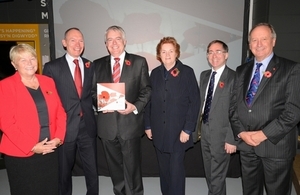Wales Office Minister marks launch of First World War centenary programme
Baroness Jenny Randerson attends launch of Cymru'n Cofio - Wales Remembers 1914-1918

L-R: Baroness Jenny Randerson; John Griffiths AM, Minister for Culture and Sport; Rt Hon Carwyn Jones AM, First Minister of Wales; Rosemary Butler AM, Presiding Officer, National Assembly for Wales; David Melding AM, Deputy Presiding Officer, National Assembly for Wales and Prof Sir Deian Hopkin, Chairman of the Cymru’n Cofio Wales Remembers 1914-18 programme board.
The First World War centenary will provide the nation with the opportunity to discover why remembrance matters, said Wales Office Minister Baroness Randerson ahead of the launch of the ‘Cymru’n Cofio – Wales Remembers 1914-1918’ programme in Cardiff on Monday (28 October 2013).
The First World War Commemoration Programme for Wales will complement the UK-wide acts of commemoration being delivered by the UK Government. A service for Commonwealth leaders at Glasgow Cathedral and a candle-lit vigil at Westminster Abbey on 4 August 2014 will signal the start of the four-year national programme to mark the centenary.
Baroness Randerson will attend the official launch of ‘Cymru’n Cofio – Wales Remembers 1914-1918’, at the Firing Line Museum at Cardiff Castle. The programme has been developed by the Welsh Government in partnership with key organisations from across Wales.
Wales Office Minister, Baroness Randerson said:
The centenary offers a unique opportunity to bring us together as a nation to honour the lives and bravery of all those who served in the war – both in the military and on the home front.
Our ambition is to deliver a truly national commemoration. In doing so, we can provide the foundations upon which to build a cultural and educational legacy, to put young people front and centre in our commemoration and to ensure that the sacrifice and service of a hundred years ago is still remembered in a hundred years’ time.
I would urge communities and people of all ages to come together to mark and remember the lives of those who lived, fought and died in the First World War.
Helen Grant, DCMS Minister with responsibility for the Government programme to mark the Centenary of Britain’s entry into the First World War added:
It’s really important that we mark the First World War centenary with a UK-wide programme, and that we do our best to help young people in particular make sense of what happened and its profound impact on everything that came after.
The centenary marks the point where it passes from living memory to written history, and we have a duty to ensure that the ultimate sacrifice that so many of our recent forebears had to make is understood and appreciated by those growing up today.
In addition to the events of 4 August 2014, a further five key dates will be marked by the UK Government: the centenaries of the Gallipoli landings, the Battle of Jutland, the first day of the Battle of the Somme, the first day of Passchendaele and, finally, Armistice Day.
In Wales, the National Eisteddfod – which will be held in Llanelli next year – will feature events with a Centenary theme, inviting people from across the country to play their part in the commemoration.
To support the centenary programme, the UK Government has announced that more help will be made available for local communities commemorating the centenary in exciting and imaginative ways. The Heritage Lottery Fund has announced the first grants under its new £6 million ‘First World War – Then and Now’ small grants programme to support projects ranging from restoring and refurbishing war memorials, to creating educational exhibitions or theatrical performances.
Notes to editors:
Heritage Lottery Fund
HLF provides funding to help groups, communities and organisations mark the centenary by exploring, conserving and sharing the heritage of the Frist World War from memorials, buildings and sites to photographs, letters and literature. A variety of grants are available from £3,000 - £100,000 upwards.
Successful projects will include:
- researching, identifying and recording local heritage;
- creating a community archive or collection;
- developing new interpretation of heritage through exhibitions, trails, smartphone apps etc;
- researching, writing and performing creative material based on heritage sources; and
- the new programme can also provide funding for the conservation of war memorials.